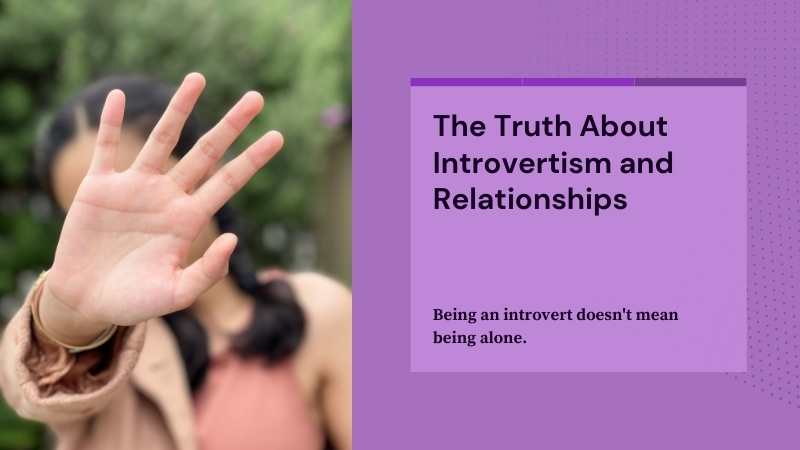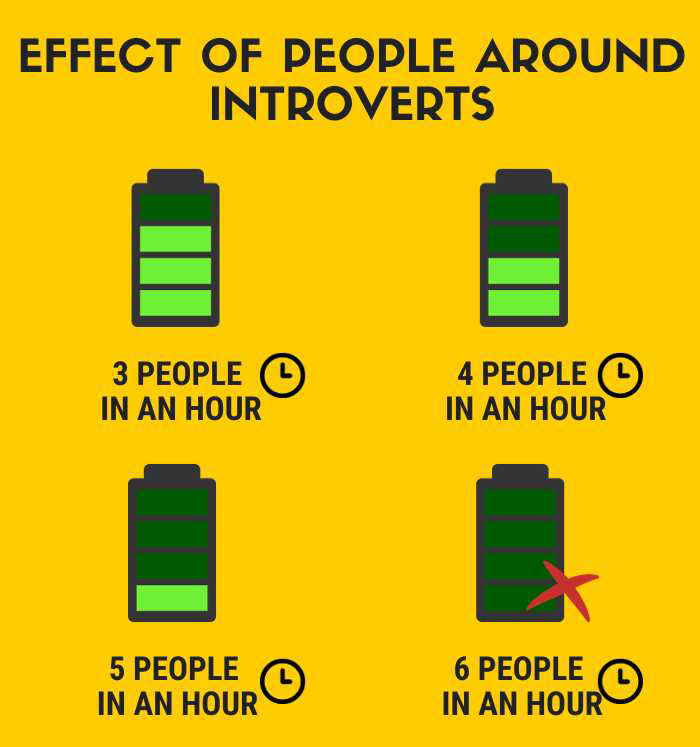We thought there were two kinds of people in the world. – Introverts & Extroverts

Introverts and Extroverts
Population Split Between Introverts and Extroverts
The general population has a 50-50 split between introverts and extroverts. There is an “extroversion bias” in the society. Extroverts are often viewed more positively as “outgoing” and “high energy,” On the other hand, introverts are characterized as “withdrawn,” “shy,” and “quiet.” [Source]
Brain Wiring and Energy Sources
As per Todd Kashdan, a psychology professor, different environments activate the reward centers in introverts’ and extroverts’ brains. Extroverts draw energy from group stimulation. Introverts need a quieter environment to recharge. This difference suggests that both personality types can learn from each other’s approach to socializing and recharging. [Source]
Potential for Change and Adaptation
Arthur Brooks from Harvard Business School suggests that introverts and extroverts can adapt and learn from each other. Introverts become happier by adopting a few extroverted behaviors like smiling at strangers or reconnecting with old friends. On the other hand, extroverts can learn to appreciate deeper conversations. [Source]
Fundamental Personality Traits
Despite the potential for change and adaptation, a study published in “Evolution and Human Behavior” indicates that people remain who they are throughout their lives. While individuals can learn to adapt and behave differently, their core personality traits tend to remain stable. [Source]
The Dynamics of Introvert-Extrovert Relationships
These kinds of people have become friends, life partners, and colleagues and have formed great relationships. Opposites attract, after all. However, there has always been trouble in one understanding the other. While extroverts find introverts’ need for alone time, space, and comfort with silence dull, introverts find extroverts’ need for constant company and ‘happening’ activity plain exhausting.
The Rise of Ambiverts in the 1920s
If this weren’t confusing enough, it’s the 1920s, and enter ambiverts. The common ground for people who displayed behavioral patterns of introverts and extroverts is where the ambiverts belong, in the neither-here-nor-there haven. Confused within themselves with their almost split personalities, imagine the plight of ambiverts trying to explain how on some days, the idea of meeting 20 new people is a super exciting opportunity to make 20 new friends on some days, and a dreadful experience of a room filled with people trying to begin the pointless small talk. Since this is a far more complicated set of people to analyze, let’s focus on understanding introverts, extroverts, and their relationships together for the length of this piece.
Understanding Personality Types
Firstly, there is no wrong and right in a personality type. There’s nothing wrong with partying every night as long as the person works all day. There’s nothing wrong in wanting to encash every opportunity to socialize. Similarly, there’s nothing wrong with wanting to go to the movies alone, going on solo trips, or even ordering to avoid human interaction. On the very basic level, though, identifying yourself as introvert, extrovert, or ambivert might be far more complicated than you’d think.
Are You Really an Introvert?

Introverts are generally believed to be closed off, self-centered, and indifferent to or disinterested in the world. But what if this is a personality trait rather than a personality type? While the seven deadly sins are commonly known and widely accepted today, one sin got left behind. The eighth cardinal sin is ‘Acedia’, derived from the Greek word ‘lack of care.’ A predecessor of and largely similar to the sin of sloth, Acedia was a term used to describe a state of sadness, making it difficult to attain spirituality with interpretations of what it truly means being wide and inconclusive, making the word (ironically so) irrelevant over the years. It is beginning to ignite some interest in the intellectual and religious discussions on its similarities to depression. On the surface, the symptoms are quite similar too.
The lack of interest dwells into your daily tasks and makes everyday work seem hectic and pointless. Soon enough, this might translate to an overall lack of interest in the present, future, or life. A general lack of interest, the foundation upon which Acedia is laid, is often confused with the symptoms of apathy and general discontent of depression. While this indifference serves as the common ground between Acedia and depression, depression is a complicated condition with many additional symptoms. A lack of interest cannot simply define it.
Acedia, depression, or just a bad day, you’re disinterested in people, is a trait that is a symptom of a temporary issue. Introversion is far more deeply rooted and a personality type that lasts far longer. (read: for life) Introversion is also not a condition to fight or an ailment. While extroverts are far more successful with people, Introverts have the gift of self-sufficiency. Introverts rarely judge themselves based on the opinions & treatment of people around them and are far more deep thinkers. Hence, a person with an introverted personality is highly self-aware and places more importance on subjectivity, while extroverts who depend on their interactions with the external world are far more objective.
The Hidden Introvert in Every Extrovert
Interestingly enough, a theory states that if you pick a person with an extroverted personality and dig deep into their unconscious, they have an introverted quality. This happens as the extraverted qualities of an individual develop in their conscious and are dominantly visible, while the introverted behavior and traits are left in the unconscious. Essentially, they are closeted introverts.
The Ongoing Confusion
The dominant differences, however, ensure they continue to be as puzzled by each other as always. More often than they would like, well-wishers have tried to push the discordant introvert out of their shell or get an introvert to stop indulging in what they view as introverts’ narcissistic love for attention. Although you have their best interest at heart, you might only add to their confusion, ultimately leading to an identity crisis.
Friendships and Relationships Between Introverts and Extroverts
In relationships between introverts and extroverts, especially in the case of romantic relationships, these differences can get fairly tricky to handle. Once the honeymoon period passes, so does the appreciation for the novel energy in their lives. Slowly, resentment develops over putting each other in unpleasant situations or environments.
The Bright Side of Introvert-Extrovert Dynamics
The picture isn’t all bad; many introvert-extrovert friendships have gotten each other out of their comfort zones. Given the difference in views, preferences, and perceptions of life, it could be surprising to see introverted people drawn to extroverted people and vice versa. Extroverts push introverts into meeting new people and trying new things, while introverts get extroverts to form deeper thoughts about their surroundings and life. While they might appreciate the challenge of stepping out of their comfort zone, they are usually thankful for the results.
Personal Reflections and Studies on Personality and Relationships
Although I am an ambivert( my college psychology lab test says so), and as much as I enjoy interacting with people(for the most part), I am a total sucker for my ‘me time,’ the downtime, or however the slang goes. A friend from college once tagged me in this meme, which is quite funny. However, while it took me a while to get there, I realized it really her way conveying how thankful she was to have me in her life.
Some studies, though, suggest that it doesn’t have to be the personality types that define the strength of the relationship. It doesn’t matter what personality type you are; if you are willing to work towards making a relationship(romantic or non-romantic) work, it most certainly will, given you are ready to keep your differences aside. If sitting and talking doesn’t help. Take a walk with them.



